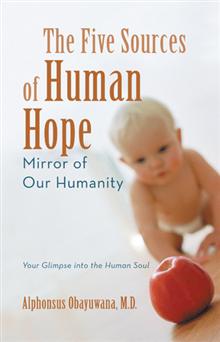Title: The Five Sources of Human Hope: Mirror of our Humanity
Author: Alphonsus Obayuwana, MD
Publisher: iUniverse
ISBN: 978-1462021901
Pages: 130, Paperback
Genre: Non-Fiction/Self-Improvement
Reviewed by: Brandon Nolta, Pacific Book Review
Book Review
What is hope? Most of us use the word every day, multiple times in many cases, but we never stop to think about what the concept really is, or how it affects us beyond the routine. Dr. Alphonsus Obayuwana has devoted more thought to it than we have, however: 30 years’ worth and more, and in The Five Sources of Human Hope, he discusses what he’s discovered and how it applies to our lives. Dr. Obayuwana’s work isn’t a self-help book, though; it’s more an attempt to define and understand the power behind one four-letter word.Beginning with his observations of patients during a psychiatry rotation, Dr. Obayuwana began a concerted effort to quantify hope, its components and how it relates to and shapes human behavior. Much of the early section of this slim volume concerns how he attempted to develop a scientifically sound basis for describing hope in objective terms, leading up to his formal definition of the five sub-domains of human hope, which he defines as intrinsic assets, human family assets, economic assets, educational assets and religious assets. Each category is explained thoroughly, and is strongly interconnected to other conclusions Dr. Obayuwana reaches in his studies. Furthermore, he describes how his discoveries regarding hope’s domains led him to other conclusions regarding hope and how people experience and act on it, including his surprising (but logical) conclusion that no person can be completely hopeless, even those who are strongly suicidal and succeed in taking their own lives.
However, in his attempt to be as specific and objectively sound in his descriptions as possible, Dr. Obayuwana unfortunately takes one of the initial strengths of his book – his clear, logical approach – and turns it into a contributing factor to its major flaw: repeatedly circling the same points so heavily that they begin to lose their meaning. Given the straightforward nature of his prose and the clarity of his thinking, this has the reductive effect of weakening the perception of his points.
In the end, this book is very readable–and also very informative. It’s a “must” read for any physician or medical student interested in the art and science of healing, or to the person going through a difficult time in their life. It will also raise and answer many questions about quality of life issues and ways to raise real hope without fostering a false sense of hope. Dr. Obayuwana successfully manages to make a coherent, thoughtful work from his efforts, one that is well worth reading.



Follow Us